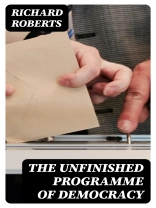In ‘The Unfinished Programme of Democracy, ‘ Richard Roberts offers a profound exploration of democratic ideals and their pragmatic implications in contemporary society. Blending rigorous analysis with an engaging narrative style, Roberts critiques and reinterprets key democratic concepts while situating them within historical and socio-political contexts. This work deftly traverses the tensions between theory and practice, demonstrating how democracy remains an evolving project, perpetually requiring vigilance and adaptation in response to changing societal needs. Roberts employs a methodical approach, integrating case studies and philosophical inquiries that challenge the reader to rethink their engagement with democratic processes. Richard Roberts is a distinguished political theorist with extensive academic credentials and a passion for democratic governance. His scholarly journey has been shaped by a commitment to examining the functionality and limitations of democratic systems, drawing on his experiences in various socio-political landscapes. Roberts’s teaching and research have consistently emphasized the necessity of critical engagement with democratic institutions, making him a compelling voice in the discourse surrounding civic responsibility and collective action. This book is essential reading for scholars, students, and anyone invested in the future of democracy. Roberts’s insights not only provoke thought but also inspire action, encouraging readers to participate actively in the ongoing dialogue about democratic values and their realization. ‘The Unfinished Programme of Democracy’ is not merely an academic treatise; it is a call to engage with the democratic project, a vital resource for those seeking deeper understanding and actionable frameworks in today’s rapidly evolving political landscape.
About the author
Richard Roberts, a distinguished political theorist, is best known for his seminal work ‘The Unfinished Programme of Democracy, ‘ in which he offers a perspicacious analysis of democratic theory and praxis. Roberts’ literary style is characterized by a rigorous, incisive inquiry into the principles of popular governance and a poignant understanding of its practical challenges and aspirations. His scholarship reflects a deep commitment to exploring the tensions and potentialities within democratic systems, delineating how they can evolve to better meet the needs of citizens in a rapidly changing world. Roberts’ work contributes significantly to the discourse on the nature of public engagement, civic responsibility, and the institutional structures that underpin democratic societies. While not as prolific as some of his contemporaries, Roberts’ focused contributions have earned him a respected place among political scholars. His investigations into the dynamic processes of democracy underscore the importance of continual progress and dialogues, encapsulating the ethos that democracy is an ever-evolving project requiring persistent dedication and refinement.












